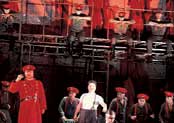OPERA SEARCH

Lady Macbeth of Mtsensk
(1932)Libretto by Alexander Preis and Dmitri Shostakovich after the short story by Nikolai Leskov (R)
3S,A,9T,2Bar,highB,8B-chorus; 2.picc.2.corA.2.Ebcl.bcl.2.dbn-4.3.3.1-timp.perc:tgl/flex/wdbl,/tamb/SD/BD/cyms/tam-t/glsp/xyl-2hp-cel-org (ad lib.)-strings; additional brass:8crt.4tpt.12hn(4A.4T.4Bar).4tuba
Abbreviations (PDF)
VAAP
Maly Opera Theatre, Leningrad
Nikolai Smolich and Vladimir Dmitriev, dir
Conductor: Samuil Samosud
Company: Small Opera Theatre of the State Academy
| BORIS TIMOFEYEVICH ISMAILOV, a merchant | High Bass |
| ZINOVY BORISOVICH ISMAILOV, his son, a merchant | Tenor |
| KATERINA LVOVNA ISMAILOVA, wife of Zinovy Borisovich | Soprano |
| SERGEI, employed by the Ismailovs | Tenor |
| A DRUNK | Tenor |
| AKSINYA | Soprano |
| MILL-HAND | Baritone |
| STEWARD | Bass |
| TWO WORKMEN | Tenors |
| COACHMAN | Tenor |
| A NIHILIST | Tenor |
| PRIEST | Bass |
| POLICE SERGEANT | Baritone |
| POLICEMAN | Bass |
| DRUNKEN GUEST | Tenor |
| SERGEANT | Bass |
| SENTRY | Bass |
| SONETKA, a convict | Contralto |
| OLD CONVICT | Bass |
| FEMALE CONVICT | Soprano |
| Workpeople, Foremen, Policemen, Guests, Convicts |
Kursk Gubernia, Russia, mid-19th century
Katerina is bored of life with her husband Zinovy Ismailov, a rich provincial merchant. When Zinovy leaves on business, his suspicious father Boris makes her swear faithfulness to his son. The workmen in the yard molest the fat cook Aksinia and encourage the foreman Sergei to rape her for their amusement. Katerina comes out to defend Aksinia whereupon Sergei seizes her hand with its wedding-ring on one finger and squeezes it until it hurts. Katerina feels weak before Sergei’s strength. That night Sergei visits Katerina in her bedroom and seduces her. In his son’s absence, Boris decides himself to sleep with his daughter-in-law. To his rage, he finds Sergei coming out of her room. He whips the foreman mercilessly, after which he demands food from Katerina. In revenge, she gives him poisoned mushrooms and he suffers an agonizing death. Making love in her bedroom with Sergei, Katerina sees the ghost of Boris cursing her, but is unafraid. When her husband Zinovy returns, she strangles him with Sergei’s help, and hides the body in a cellar. Her regular checking of the cellar is noticed by a drunken peasant who goes there himself, expecting to find hidden vodka. Seeing Zinovy’s body, he runs to tell the police. Displeased and bored not to have been invited to Katerina and Sergei’s wedding, the police are delighted to hear about the body. They rush to interrupt the wedding feast, Katerina confesses everything, and she and Sergei are arrested. A large group of convicts, including Katerina and Sergei, is travelling to Siberia and stops for the night beside a lake. Sergei has now tired of Katerina and flirts with the beautiful young Sonyetka. When Katerina tries to get him back, he asks her for her stockings, saying he is cold. She gives them to him, but he passes them straight on to Sonyetka and together he and Sonyetka mock Katerina. In rage and despair, Katerina drags Sonyetka and herself into the lake, where they both drown.
One of the masterpieces of Shostakovich’s early years, and one of the great operas of the 20th century, ‘Lady Macbeth’ is a masterly and thrilling musical version of a terrifying tale by the 19th century writer Nikolai Leskov. From the very beginning of its existence this opera has provoked passionate admiration and almost equally passionate condemnation.
The story tells of a young woman of the deep provinces, Katerina Izmailova, who, lonely and bored with her marriage and her life, takes a lover, the foreman Sergei. With the connivance of Sergei, she murders first her rich father-in-law and then her husband, thereby becoming owner of the rich mill that had belonged to them. But her crime is discovered and she and Sergei are condemned to exile in Siberia. When Sergei takes another convict, Sonia, as his new mistress, the betrayed Katerina hurls Sonia and herself into a deep river where they both drown.
To write the music of what is, to all intents and purposes, a melodramatic thriller, Shostakovich returned to the language of 19th century Russian composers and to the example of Verdi. The result is one of the most vocal operas of its time, in which the drama is unfolded through brilliant arches of solo and choral sound, interspersed with brutal or melancholy orchestral interludes and outbursts. The effect is to lift a pessimistic tale of ignorance, coarseness and violence to the level of high tragedy.
Early productions of ‘Lady Macbeth’ from 1934 onwards were so successful that the opera was quickly taken up internationally. In January 1936 Stalin and his henchmen visited a production of the opera in Moscow and, a few days later, a virulent and scurrilous official campaign was launched against the composer, beginning with a world-notorious article headed ‘Muddle instead of Music’ which branded him as decadent, pornographic, bourgeois, pro-western, and, in sum, anti-Soviet. This turned out to be the signal for the start of one of Stalin’s most vengeful and repressive campaigns against the Soviet intelligentsia as a whole. Shostakovich’s career was, at least temporarily, in ruins. The opera was hardly to be revived again until the 1960s, when it appeared in a revised and toned-down version (see op.114). Since the rediscovery of the original version in the 1980s, this opera has hardly been absent from the international operatic scene. It may now be considered standard repertory.
Note by Gerard McBurney
Dramatic
Galina Vishnevskaya, Nicolai Gedda, Dimiter Petkov, Werner Krenn, Robert Tear, Taru Valjakka, Martyn Hill, Leonard Andrzej Mróz, Aage Haugland, Birgit Finnilä, Alexander Malta, Leslie Fyson, Steven Emmerson, John Noble, Colin Appleton, Alan Byers, James Lewington, Oliver Broome, Edgar Fleet, David Beavan, Linda Richardson, Ambrosian Opera Chorus, London Philharmonic Orchestra, Mstislav Rostropovich
EMI CDM 567 776-2 (2CDs)
